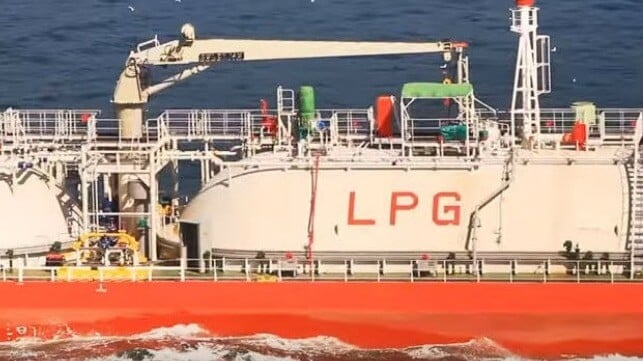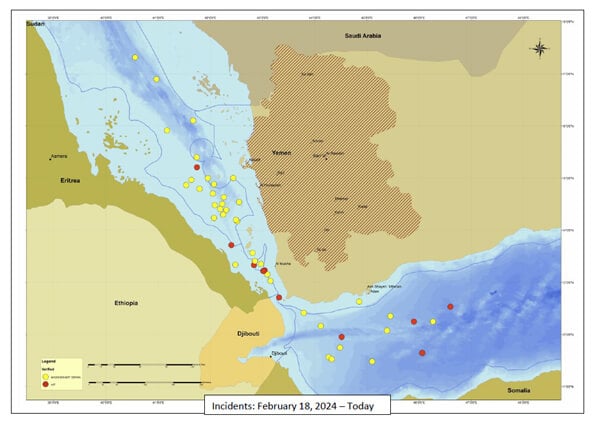Houthi Claim Long-Range Attacks Including LPG Carrier in the Mediterranean

The Houthi claimed specific long-range attacks on Friday during their weekly rallies after weeks of threatening to expand their range during the so-called fourth wave of their efforts. Military sources and security analysts are warning of the capabilities while most of the attacks continue to be in closer proximity to the Houthi-controlled areas of Yemen.
In the latest statement of Houthi spokesperson Yahya Saree, he took credit for three recent attacks without providing details. Two of these he said took place in the Arabian Sea and the Mediterranean, although monitors such as the UK Maritime Trade Organizations, EUNAVFOR Aspides, and the U.S. Central Command have not recorded these attacks.
One cited was on a vessel called Essex that they said was Israeli and had entered the ports under the Houthi blockade. Multiple sources are matching the vessel up with the LPG carrier Essex (26,447 dwt) with a capacity of 35,000 cbm of gas. The ship’s AIS signal shows it in the anchorage at Alexandria, Egypt after shifting from Port Said.
The vessel registered in Liberia is managed by Zodiac Maritime of the UK, which has been a target of the Houthi due to the investment by Israeli shipping magnate Eyal Ofer. Reuters is quoting a spokesperson from Zodiac as saying nothing unusual has happened to the vessel recently while Ambrey says the vessel has not left Egypt recently.
The direct threat on a specific ship in the Mediterranean comes after Bloomberg cited an unnamed “senior defense official” saying this week that the Houthi could reach the Mediterranean. The report said the U.S. was concerned based on the advanced weaponry the Houthis were using.
While it appears they might have the range, security experts are still questioning the accuracy of their attacks, especially given the frequent misses of moving ships at a much closer range. Also, they cite the ability of Israel, the U.S., and other forces to detect long-range missiles.

Clustering of incidents between February and May (Aspides)
In its most recent assessment, EUNAVFOR Aspides writes, “UAV and missile attacks occur along the primary navigation route off the coast of Yemen, with the highest risk area spanning approximately 200 nm northbound and eastbound of Bab al-Mandab Strait, towards the South Red Sea and the Gulf of Aden.” They published a map showing the clustering of attacks.
The second threat came against the MSC Alexandra (190,734 dwt) one of MSC’s larger vessels sailing currently from Spain and due to reach Abu Dhabi tomorrow, May 25. The Houthi claimed to have fired on the vessel while it was in the Arabian Sea. They have frequently targeted MSC for its association with Israel, although this vessel is owned by the Geneva-based company.
It is unclear when the attacks allegedly took place because the third one they took credit for happened yesterday. The vessel, a Greek-managed bulker named Yannis (50,779 dwt) and registered in Malta reported an explosion in the waters nearby on Thursday. A single missile hit the water while the vessel was 68 miles off the Yemeni port of Al-Hudayda. The ship’s AIS track shows it transited the Suez and reports it is heading to Mombasa, Kenya.
The Houthi singled the ship out and its manager Eastern Mediterranean Maritime, saying that three of the group’s ships had called in Israeli ports on May 4 and 5. Eastern Mediterranean Maritime reports it currently manages 75 vessels. The company manages another bulker, another bulk carrier, Cyclades, which was attacked also in the Red Sea last month and sustained minor damage.
U.S. CENTCOM also reported that two Houthi-launched anti-ship ballistic missiles fell into the Red Sea on May 23. They said there were no injuries or damage reported by U.S., coalition, or commercial ships.
“The occasional drop of confirmed attacks in the Red Sea, Bab al-Mandab Strait, and the Gulf of Aden shall however not dismiss the fact that Houthis still hold the capacity to launch such attacks,” Aspides warned this week.
